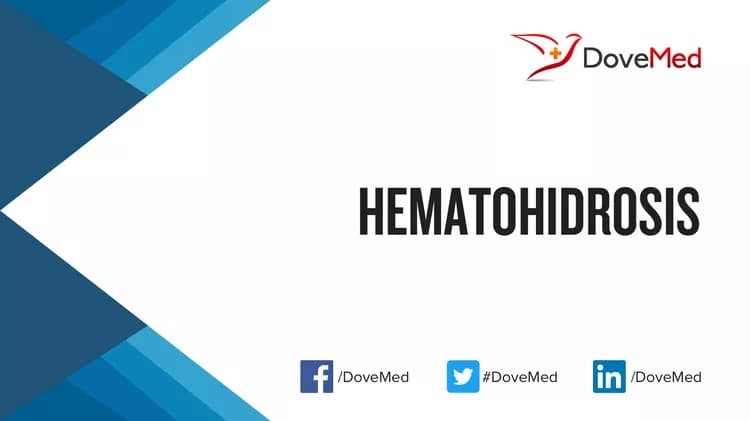What are the other Names for this Condition? (Also known as/Synonyms)
- Blood Sweat
- Hematidrosis
- Hemidrosis
What is Hematohidrosis? (Definition/Background Information)
- Hematohidrosis, also known as Blood Sweat, is a rare disorder of unknown cause that is characterized by bleeding episodes, which causes spontaneous bleeding from the skin surfaces, ears, and nose, among other organs
- In some cases, Hematohidrosis may be observed in the background of systemic disorders such as hypertension, severe stress, fear, blood disorders, and even menstruation. It is reported that the bleeding occurs from a rupture of small blood vessels on the skin
- The management of Hematohidrosis may involve vitamin C supplementation, administration of antihemorrhagic agents, and anxiety medications. The prognosis of the condition may vary from one individual to another depending on its severity. However, in some cases, a spontaneous resolution is noted
Who gets Hematohidrosis? (Age and Sex Distribution)
- Hematohidrosis is a rare disorder and very few cases have been reported in the medical literature
- The presentation of symptoms may occur at any age
- Both males and females may be affected
- Worldwide, individuals of all racial and ethnic groups may be affected
What are the Risk Factors for Hematohidrosis? (Predisposing Factors)
The risk factors for Hematohidrosis may include:
- Physical exertion
- Emotional stress
- Extreme fear
- Systemic disease
- Bleeding disorders
- High blood pressure
It is important to note that having a risk factor does not mean that one will get the condition. A risk factor increases one’s chances of getting a condition compared to an individual without the risk factors. Some risk factors are more important than others.
Also, not having a risk factor does not mean that an individual will not get the condition. It is always important to discuss the effect of risk factors with your healthcare provider.
What are the Causes of Hematohidrosis? (Etiology)
The exact cause of Hematohidrosis is not known. Several theroies have been proposed for the bleeding that occurs due to rupture of small blood vessels in the skin. These theories include:
- Increased vascular pressure leading to the passage of blood cells through the ducts of the sweat glands
- Inflammation of the vessels of the skin (vasculitis of dermal vessels) and intensified sympathetic activation
- Psychogenic purpura or spontaneous bleeding in the absence of a trauma
The bleeding episodes of Hematohidrosis may be triggered by the following conditions in some individuals:
- Bleeding disorders
- Severe physical and emotional stress
- Fear
- High blood pressure
- Menstruation
- Systemic disease
What are the Signs and Symptoms of Hematohidrosis?
Hematohidrosis is characterized by episodes of bleeding, which may occur anywhere in the body, but most often is reported on the face. In some cases, the oozing may have tinges of blood while in others, one may be able to directly see blood.
The signs and symptoms of Hematohidrosis may vary from one individual to another and may include:
- Bloody sweat
- Blood oozing from intact skin
- Bloody tears or crying blood
- Bleeding from nose and/or from one’s ears
How is Hematohidrosis Diagnosed?
Hematohidrosis is diagnosed on the basis of the following information:
- Complete physical examination and thorough family and medical history evaluation
- Assessment of signs and symptoms
- Laboratory tests that may include:
- Blood coagulation studies
- Complete blood count
- Reticulocyte count
- Urine hemoglobin test to detect the presence of hemoglobin in urine
- Examination of peripheral blood smear under a microscope by a pathologist
- Dermoscopy: It is a diagnostic tool where a dermatologist examines the skin using a special magnified lens
- Imaging studies, as needed
- Biopsy studies, if necessary
Many clinical conditions may have similar signs and symptoms. Your healthcare provider may perform additional tests to rule out other clinical conditions to arrive at a definitive diagnosis.
What are the possible Complications of Hematohidrosis?
The complications of Hematohidrosis may include:
- Anemia that may result in shortness of breath, fatigue, and pale skin
- Recurrence of bleeding episodes
- Fear and anxiety about the condition
Complications may occur with or without treatment, and in some cases, due to treatment also.
How is Hematohidrosis Treated?
The healthcare provider may evaluate the treatments for Hematohidrosis, which may include:
- Vitamin C supplementation
- Hemostatic drugs
- Anxiolytics to control anxiety
- Propranolol to treat anxiety among other ailments such as high blood pressure
- Antidepressants
- Psychotherapy
Regular medical screening at periodic intervals with tests and physical examinations are recommended.
How can Hematohidrosis be Prevented?
- The exact cause of Hematohidrosis is not known, and therefore, no preventive methods or guidelines are available at the present time
- However, recognizing the triggers and seeking medical attention may help reduce severity of the signs and symptoms
What is the Prognosis of Hematohidrosis? (Outcomes/Resolutions)
The prognosis of Hematohidrosis is dependent upon the severity of the signs and symptoms and associated complications, if any.
- In some cases, the condition may resolve spontaneously
- Hematohidrosis may be treatable if the triggering factor is correctly identified
- Typically, the prognosis may be assessed on a case-by-case basis
Additional and Relevant Useful Information for Hematohidrosis:
The following DoveMed website link is a useful resource for additional information:
Related Articles
Test Your Knowledge
Asked by users
Related Centers
Related Specialties
Related Physicians
Related Procedures
Related Resources
Join DoveHubs
and connect with fellow professionals



0 Comments
Please log in to post a comment.